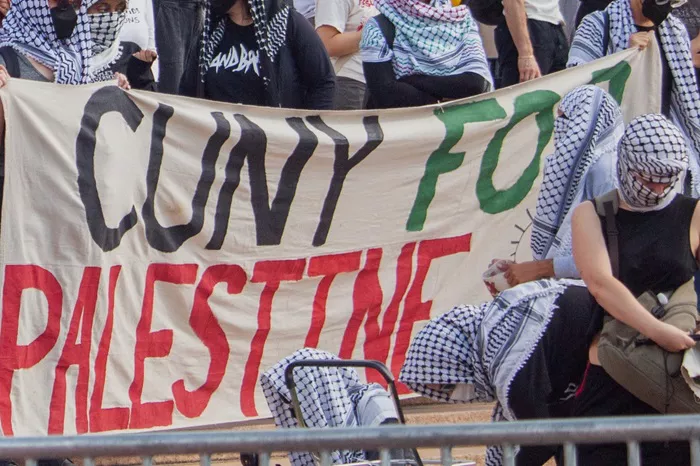The City College of New York’s (CCNY) chapter of Students for Justice in Palestine (SJP) unveiled the “Bilal’s Boycott Campaign,” a movement aimed at boycotting cafés that have expressed political or financial support for Israel. The initiative encourages patrons to support seven local coffee shops that have partnered with SJP instead.
Participating cafés include Tajeen Halal Food, Avrilillies Creamery, Kaafi by Chaiguy, and Qahwah House. Customers can mention “SJP sent me” to receive a boycott card, which offers a free eighth drink after the purchase of seven drinks, according to an announcement shared via the chapter’s Instagram.
In addition to the primary partners, the SJP post lists non-participating local businesses recommended for support, including Sugar Hill Cafe, Manhattanville Coffee, NBHD Brulee, Cafe One, and I Like It Black.
Hadeeqa Arzoo Malik, president of the CCNY SJP chapter, explained that the campaign’s concept originated last year but gained momentum this semester following the expulsion of an alumni-owned café from the CCNY campus.
“The semester after the encampment, CCNY and CUNY decided that on this very campus where we escalated and we said, ‘Divest from genocide,’ they decided to … invest in it even more by kicking out our alumni-owned café,” Malik stated.
The campaign is named after Bilal the Beaver, the chapter’s mascot. Arzoo recounted that a stuffed beaver named Bilal was taken by the New York Police Department during their April sweep of the CCNY “Gaza Solidarity Encampment.”
The boycott specifically targets cafés within the North Academic Center and the Marshak Science Building, which recently came under the management of Aladdin Food Management Services. These locations now serve products from Nestlé and are labeled “We Proudly Serve Starbucks,” prompting concerns among campaign supporters. Arzoo articulated her motivation for the boycott, stating, “Nestlé is even worse than Starbucks. Starbucks has really horrible indirect investments. Their CEO is a huge Zionist, and that was enough means for a boycott. … But when Nestlé came in, it became even worse. Nestlé is directly on the BDS list.”
Abram Morris, a student organizer at CCNY, echoed these sentiments, condemning the decision to serve Starbucks products as a betrayal of the values that should resonate with alumni and the community. “For me, personally, it’s not just a boycott of companies that are complicit with genocide in Gaza,” Morris remarked. “It’s a boycott of our system, and in recognition that at our college campuses, we shouldn’t be forced to confront the same system that we have to confront everywhere else.”
Morris further emphasized the importance of supporting locally owned businesses over large corporations, saying, “What would really make this better is if we had a slew of locally owned Harlem businesses that occupy our dining facilities and not this massive company.”
Beyond the CUNY campus, the boycott list includes Dear Mama, located in Columbia University’s Jerome L. Greene Science Center, as well as all Starbucks locations in the vicinity. Arzoo noted that the decision to include Dear Mama stemmed from a boycott initiated by the Columbia chapter of SJP. “We did a little research and found out that Columbia SJP had actually launched a boycott for that coffee shop because it was owned by a Zionist and is also owned by Columbia University itself,” she explained. “So we were totally like, all right, we got to just carry on their legacy.”
The campaign appears to be gaining traction, with businesses like Qahwah House already requesting additional boycott cards. Each of the four participating cafés initially received 125 cards for distribution.
“As soon as we launched that map and we launched these cards and these programs, it’s been a really big success,” Arzoo shared. “I have to restock already.”
Looking ahead, Arzoo indicated that the boycott does not currently have a definitive timeline. “We’re planning to continue for the foreseeable future, so long as the cafés in the NAC and Marshak are still owned by Nestlé and any company, any supplier that is complicit in genocide and the exploitation of Palestinians and anywhere across the world,” she stated.
As the campaign unfolds, it highlights a growing trend among students advocating for ethical consumption practices in support of Palestinian rights. The movement not only encourages local patronage but also seeks to challenge corporate complicity in global injustices, reflecting a broader commitment to social justice within educational institutions.
Related Topics:
Sputnik Coffee Launches Chic New Café and Roastery in Chicago
Brazil’s Coffee Fields Wilt Under Frost and Drought: A Harvest in Peril
Vietnam’s Coffee Prices Surge: Robusta Tops Global Charts


